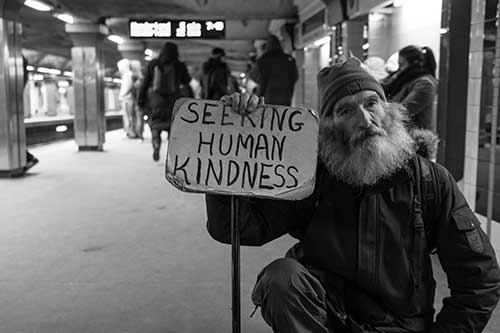My father enjoyed telling the story of the first time he saw me.
Three babies were lined up in bassinets behind the hospital glass. The newborns on each end were crying madly while the one in the middle, me, had his hands over his ears, trying to block out the noise.
I realized later in life that this was more than a favorite story of my father, but also a symbol for work I need to do in this life: to go beyond my introverted nature and comfort-zone of solitude to hear the cries of others.
My family of origin gave me ample opportunity toward this purpose. My mother struggled throughout my childhood with serious mental health problems and my role in the family emerged to be her attentive listener and to some extent, emotional caretaker. It is not surprisingly that as a young adult I veered away from my inclination to pursue a career as a writer to train as a clinical psychologist.
A career as a psychologist has been a blessing to me, providing me with opportunities for a diverse yet interrelated set of meaningful work activities. Even more importantly, I have been given the chance to know in deep and genuine ways some of the best people on earth.
Trauma, Suffering—and Resilience
Hundreds of people living homeless with mental illness have touched me by sharing their stories—replete with trauma, abject poverty, losses, and serious mental health symptoms. But even more, beyond their calls of suffering and need, they have inspired me by their courage to face hardships and to recover, to grow, and sometimes eventually to thrive.
I have witnessed similar experiences—of suffering, resilience, and growth—in other neglected groups struggling with mental health problems, including youths in trouble with the law, people with HIV/AIDS, people with persistent alcohol or drug addictions.
A parallel pattern—of facing difficulties and finding transformative growth—also emerged among the broad cross-section of people I have seen in psychotherapy, ranging from homeless people with schizophrenia to corporate CEOs struggling to find meaning in life.
Meanwhile, I have had the privilege to know many mental health professional who are among the most caring people in the world.
All too frequently, however, in the process of serving others, mental health providers and other caregivers—like most of us—have forgotten how to care for themselves. As a result, they have become overwhelmed with burnout and lost their passion for life.
A Longing for Happiness
Across these diverse groups, there is a commonality of human experience that transcends differences. We all struggle with stresses, losses, and existential realities.
We also all possess strengths, goodness, inherent worth, and spiritual facets. Moreover, we are all born with longings to connect, to love, to be well.

Photo: Matt Collamer, Unsplash.com
Most of all, perhaps, we want to be happy.
But being well and happy is often not easy. Life confronts us with many difficulties and the social world can be more harmful than helpful, especially these days. We live in a critical moment in history. Even as our happiness declines and mental health disorders increase, we also face a plethora of social, political, and environmental problems.
Reasons for Optimism
There is no reason for despair, however, and indeed there is much reason for optimism.
We have enormous potential—and ultimately final responsibility—for our own happiness and well-being.
The process of becoming healthier and happier is a personal journey—and often a challenging one. I know from personal as well as professional experience that we all face a plethora of issues across life. These experiences can feel acutely personal and yet they are common, including:
- The angst of uncomfortable emotions—anxiety, hurt, anger, grayscale days of depression
- The struggle—often unsuccessful in our first attempts—to create and sustain loving, intimate relationships that remain healthy over time
- The deep, lingering sadness that pervades after the loss of a loved one
- Recognizing—often with terror, once we overcome denial—of one’s own mortality, as well as all of those whom we love
One Essential Question
Further, each of us must face one essential, ultimate question: How shall I live? Or perhaps better yet: How can I live—well? Our answers to that question define our character and create personal meaning out of the troubles and uncertainties of life.

Photo: Alex Gruber, Unsplash.com
Fortunately, psychological practices can help us to be happier. Positive psychology has provided us with an array of science-based methods that improve our well-being. These are critical pieces to live happier lives, but they are only part of an effective strategy.
We also need a broader vision of what it means to live well. In particular, we can benefit from the insights of depth psychology, which allows us to understand our inner selves, our motives, our habits in deeper, clearer ways. And we need to integrate the wisdom from older traditions—philosophy, mythology, world religions—to live a life that is meaningful and truly fulfilling.
In the process of synthesizing knowledge from psychology and the older wisdom traditions, as I hope to do in blog posts and other writing, we can learn then to live with big hearts, with the capacity to care deeply for both others and for ourselves.
For true happiness is found not only by addressing one’s own needs, but also by hearing and responding to the cries of the others.
Featured Photo: Katie Smith, Unsplash.com



Follow Me: